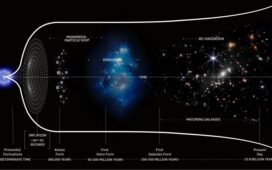50 years ago, Stephen Hawking showed that black holes emit radiation and eventually decay away. That fate may now apply to everything.
When black holes were first derived within the context of General Relativity, it was thought to be an absolute, irrevocable end-state of a completely collapsed object. Aside from possessing mass, electric charge, and angular momentum, no other properties would matter, and so long as nothing else interacted with the black hole, those properties would persist — and would persist unchanged — forever.
That all changed, however, when people began treating the Universe as quantum in nature: with quantum fields (like the electromagnetic field) permeating all of space. This would include even the space around a black hole, and quantum effects in highly curved spacetime would lead to the gradual emission of radiation that now bears the name of the person who predicted it: Hawking radiation. On long enough timescales, even the most massive black holes would eventually evaporate away.
Last year, a fascinating new study suggested that Hawking radiation might not be for black holes alone, but would rather be produced by all masses that curved space by a significant enough…















